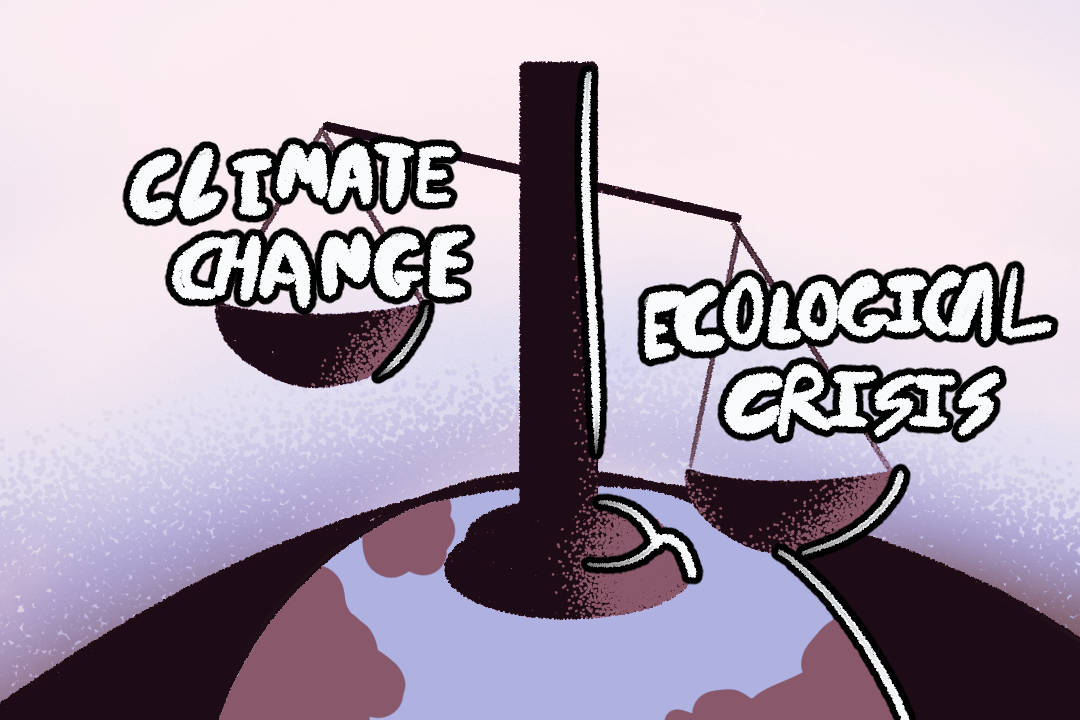The term “climate crisis” has lost its meaning. If people — myself included — have time to sit and ponder the meaning of a particular crisis, I think it is abundantly clear that the crisis itself is not being taken seriously as an urgent matter. To me, a crisis implies quick action. However, in the case of the climate crisis, many still debate what needs to be done and who should do it.
In short, it appears to me that we’re acting with no urgency on the climate crisis and I believe that the language we use sets the tone for action. Thus, in my view, we should adopt the phrase “ecological crisis” to more appropriately address the crisis’ broader impacts.
The history of the term “climate change”
Wallace S. Broecker coined the term “global warming” in his famous article, “Climatic Change: Are We on the Brink of a Pronounced Global Warming?” The article, published in Science magazine in 1975, details the concept of human-induced climate change: “If man-made dust is unimportant as a major cause of climatic change, then a strong case can be made that the present cooling trend will, within a decade or so, give way to a pronounced warming induced by carbon dioxide.” Broecker highlights “man-made dust” that contributes to the Earth’s rapid heating and predicts that this rapid heating will correlate with the rapid change in climate.
The term “climate change” makes sense to me in the scientific context of the patterns of weather changing due to human activity or destruction. However, in the context of enacting social, political, or economic change, I believe the term’s meaning is clouded by the overwhelming pressure on social justice groups, politicians, and businesses to address the entire environmental problem.
When did we start talking about the “climate crisis”?
The environmental movement in North America first began to gain traction in the 1970s when Wisconsin Senator Gaylord Nelson organized the first Earth Day as a demonstration to advocate for environmental issues and to show respect for life on Earth. Since then, numerous organizations have banded together to join the fight for environmental justice.
In 1980s, North America suffered a heat wave that resulted in record-breaking temperatures and wildfires. This was evidence of the effects of global warming and mass climate change, making this a more obvious threat. Since then, climate change appears to have largely dominated the public conversation, leading to the creation of government departments dedicated to it, such as Environment and Climate Change Canada. To this day, environmental justice groups, organizations, and movements that deal with more than climate change use the term ‘climate change’ as all-encompassing.
The term “climate crisis” became popularized in the 2010s by activists like Greta Thunberg and those in the scientific community to draw more attention to the crisis. World leaders began calling the climate a “crisis,” like when Prime Minister Justin Trudeau’s Liberal Party declared climate change a national emergency in 2019 with the former Minister of Environment and Climate Change Catherine McKenna describing the situation as a “real and urgent crisis.”
It’s now time to rebrand
I admit, “climate change” or “climate crisis” is catchy. The terms are frequently used in statements like “The Climate is Changing, so should we” and “Systemic change, not climate change.” However, the adrenaline associated with it has run out. If we want to talk about the full scope of the human-induced and rapid destruction of Earth, we need to expand our language to include all components of environmental degradation. This includes issues such as climate change, ocean acidification, global freshwater use, and the loss of biodiversity.
Over the summer, I took ENV222 — Pathways to Sustainability, where the professor posed an argument for using the term “ecological crisis” instead of “climate crisis.” The word ‘ecology’ means “the study of the house,” because the root of the word “ecology” comes from the German word ‘Ökologie,’ which gains its roots from the Greek word ‘oikos,’ meaning “house.” The term “ecological crisis” itself suggests that our house is in crisis, not just the pattern of weather. In my opinion, the term “ecological crisis” becomes more personal, because it is our home that is being destroyed.
Why does it matter?
Overall, the debate surrounding the current declining state of the environment is turning from whether or not there is a crisis, to what needs to be done on it and by whom. The term “ecological” characterizes the broader impact of this crisis because the scope of the issue extends past the climate and to the broader entity of the environment.
That being said, whether we call it the “climate crisis” or the “ecological crisis,” it is still a problem that needs to be addressed. Still, the discussion of the rhetoric surrounding the problem is important because I see it as an opportunity to reflect on the importance of the environmental movement and the structural changes it is fighting for. The language we use sets our tone. I think it is time we rebrand and refocus the ecological discussion.
Hannah Katherine is a third-year student at Innis College studying literature and critical theory. She is a Climate Crisis columnist for The Varsity’s Comment section.



No comments to display.